There are two types of people: those who fold the corners of their books and those who don't. There was a fellow corner-folder on the train this morning and I couldn’t help but hold a little space in my heart for her. It always irritated me when others told me not to fold. “To preserve the book,” they said, “so you can enjoy it better.” Personally, I’d rather devour them. When I hand you a book, I want you to know how much time I spent enjoying it, despising it, or simply thinking about it because I like my books worn out and well-read. I prefer to leave a mark.1
It’s so much easier to be that way with books; not so much with people. Books are simple. I have the freedom to pour myself into them, to connect and be obviously enamoured, knowing I’ll receive something of value in return. We don’t have that same control with each other. Often, I find myself wanting to be entirely untraceable, especially if a relationship2 has taken a sour turn. Instant detachment, a handover of keys and revoking of access. Even before then, I approach with trepidation, questioning how much of myself I should guard and how much of it I should share. Discerning which parts you can relate to, be comfortable with, only for me to take the course with least resistance.
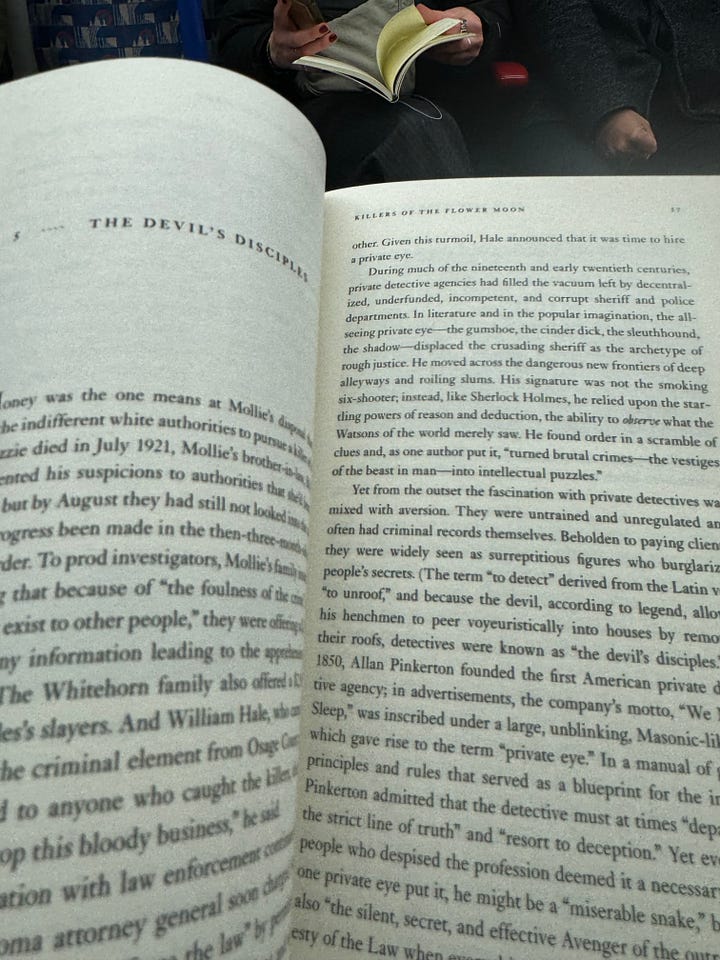

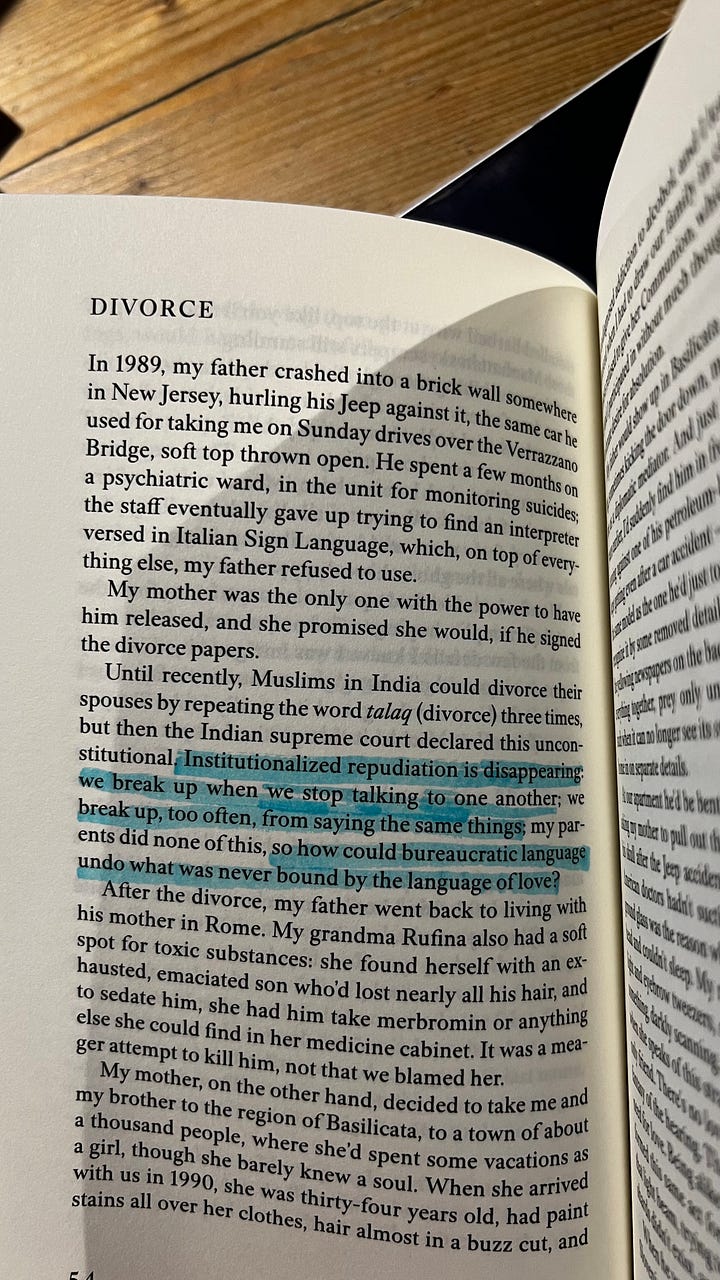
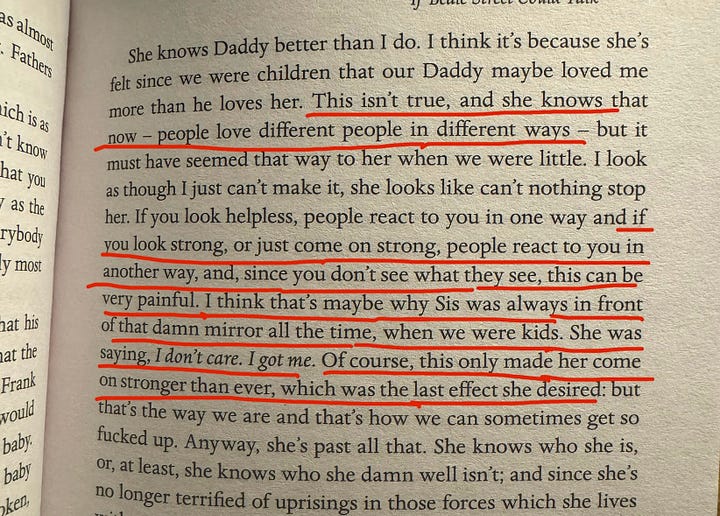
I often trick myself into thinking nonchalance is the best way forward. I start downplaying my passions, or things I take comfort in simply because I can and do. That’s the fear, right? That the thing you covet is actually a fickle pursuit. Take my writing, for example. I say I started a new TikTok account or a newsletter quietly because I wanted to ‘focus’ or ‘start afresh,’ but in truth, there has always been an underlying caution because I know I’m at least a little susceptible to judgment. The first time friends of mine found my account, I waited with bated breath, fearing they’d never speak to me again. It felt like a wall had come down, and now they could see how much I actually cared—about everything.
Was it weird how much I analysed things? How I could find connections in the most unlikely places and, once again, care so much about the seemingly mundane? “Oh yeah, it’s just something I started,” I’d say, as if that first compliment from someone who actually knew me didn’t fill me with enough glee to make the annual winter blues feel like a momentary blip—at least for that day. As if I haven’t been scribbling sonnets in margins and writing sprawling stories since I could first pick up a pen. Eventually, the shock of discovery wore off, and slowly but surely, friends trickled in, one by one, into my following list.
Nowadays, I have little to no problem mentioning my newsletter, but it’s always easier to let others happen upon it. In the beginning, I was terrified someone would break the spell, reach through the haze of delusion, and tell me my writing was awful. I must, of course, acknowledge that having people subscribe and interact with my work helps combat this feeling—it feels like a badge of recognition, real recognition. But at some point, I’ve felt the same way about most of my interests, always waiting for someone to tell me I’m wasting time or that I need to grow out of it. Perhaps that’s why, when you ask me what I do, I lead with my primary job first and then mention my writing. I’m very proud of landing a cybersecurity placement—it brings me an immense sense of accomplishment and joy—but it also affords me a sense of legitimacy that puts some people at ease. I’m doing what I’m supposed to be doing, joining the league of workers, so I can afford to have creative pursuits.
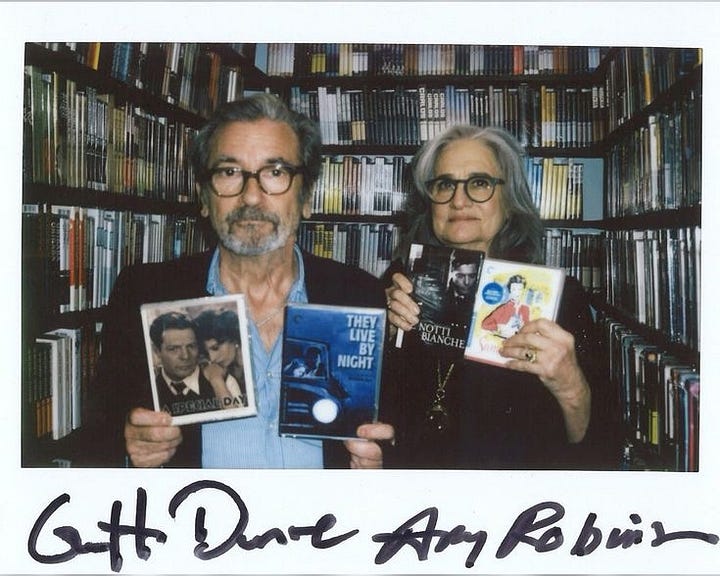

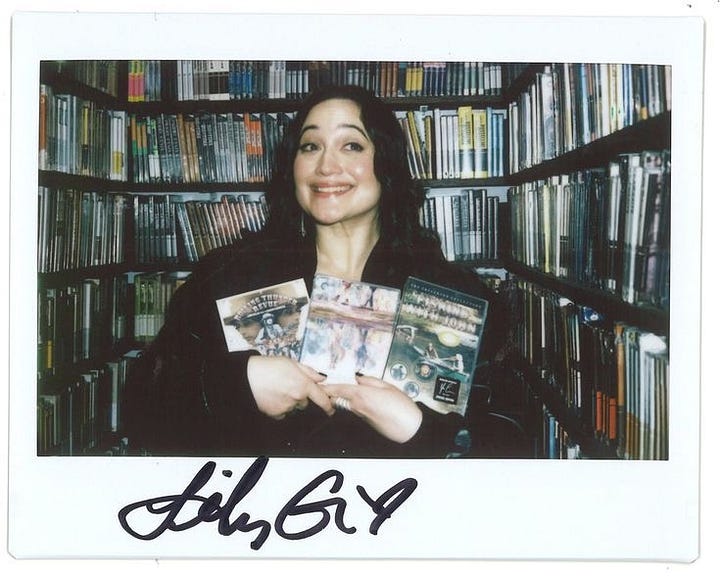
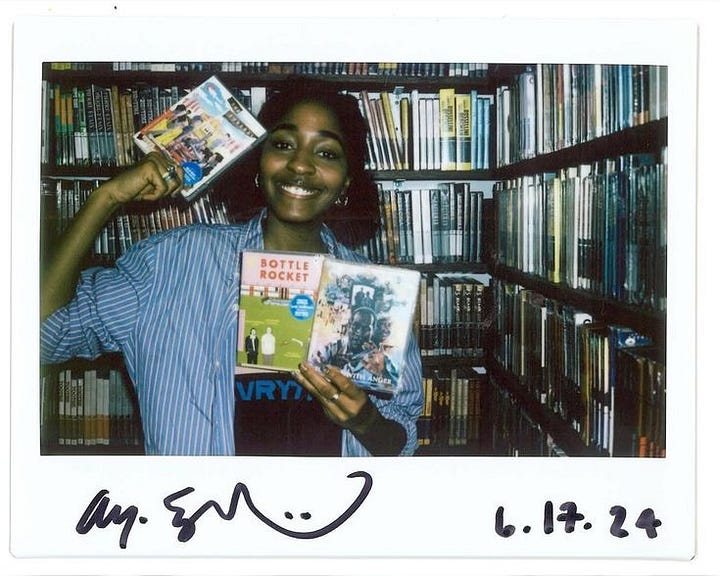
As it so often does, my mind drifts to romance, and I think about how many people—crushes or "situationships," if you will—have truly known about my real hobbies or passions. Sure, at some point they’ve known about the dancing, the singing, or whatever niche historical rabbit hole I’ve gone down that week, but only a rare few have known the rest, possibly because it was part of how we met.Being made to feel embarrassed or ashamed by a friend, while painful, often pales in comparison when it comes from someone you like. As luck would have it, a new mutual of mine, Judah (@jvdah on TikTok), made a video expressing just that. He says he’s ‘fed up with how easily people dismiss things [he’s] passionate about simply because they don’t know or care about them,’ even going as far as to call them ‘dumb, not real, or childish.’
I think this emphasis on compatibility has robbed people—especially those seeking relationships—of vital experiences like discovery or simply getting to know someone in ways they hadn’t considered before. To me, that’s the best part of any relationship, not just romantic ones. A couple of Sundays ago, I had the best conversation with a new friend. You know the type—when you start on one point and end up talking about love, family, and random things you haven’t told your closest friends, but for some reason, you feel comfortable sharing with them. When Tara, one of my oldest confidants, asked me to recount my weekend, she was quick to point out how visibly I lit up during this part of the story. She’s noticed, and she’s right—there’s a certain way I speak about these kinds of interactions. I imagine I must look like a child rediscovering their favourite toy or experiencing a new sound—completely entranced. I’m going to quote myself for the first time in my substack career but I can’t think of a better way to convey how much I value this process.
People are messy, disappointing, complicated and ultimately a complex web of thoughts and experiences. People are also beautiful, loving, hopeful and everything in between. The beauty of connection is the joy found in uncovering all of this with them, instead of imposing a predestined path on yourselves - from “romanticisation is the quickest route to disappointment” by me
Learning about another person is akin to exploring a new world and the only way to dull that sensation is by sticking to a script - locking away your core, your beautiful trove of passion and intrigue away for a later, “safer” time. At least until something goes wrong and there’s no longer a reason for it, then it becomes the heaviest burden and instead of viewing it under the light you once did, it’s cast in the shadows, becoming a symbol of the time you “wasted” getting to know them. As serendipity would have it, I came across another TikTok as I was thinking of this very thing.
Beth (@inartasinlove) wrote “date cancelled on me and now I revisit the thoughts of never being known and having to repeatedly pass on small details of my life to strangers at coffee shops and restaurants. In hoping that this person may be the last to hear of it, that I’ll be free of small talk and invite deeper questions and connections. To be known without question, to have someone know how I take my coffee”.
It’s no wonder we don’t easily open up about our passions or the things we truly care about. We present our attachment to them as fleeting, circumstantial, or convenient at best. What’s the point of exposing ourselves to judgment and vulnerability, all on the off chance that it will make a difference? In all honesty, it’s a laborious process—finding new ways to share the same parts of ourselves with a different person. This same fatigue drives our desire for compatibility. The cutest scenes, or at least the most heartwarming in romantic media, are the ones where it seems like the characters are finishing each other’s sentences, instinctively anticipating the smallest of thoughts as if they were their own. It may seem like compatibility, or two like-minded people, but it’s really just being extremely well-versed in your partner—all of them.
Oh, but imagine—a feat we can all easily recall—how hard it is to express not only our passions but our emotions too, especially in reaction to others. There were a couple of cold years in which I tried my hardest not to care. The problem is that in order to do so, you must keep yourself as removed as possible, the antithesis of what you desire, which is to be even closer.
There was a particularly dramatic moment when someone sent me a paragraph mansplaining my own feelings, trying to coax me into sharing. He was presumptuous, but there was some truth to what he said, and I didn’t care nonetheless. Fast forward a couple of months, and I’m comforting another person even though he let me down. He’s more visibly upset than I am because he’s been drinking and thinks I deserve honesty (because I’m such a “straightforward person”). In that moment, I can admit now that I was reeling and wanted with all my might to show it, but I didn’t. I sat there patting his back, telling him it was fine. I’ve conditioned myself to always be the better person, to take the highest road. In part, it’s a battle with my ego; I don’t want to give him the satisfaction of affecting me. But in that denial, I in turn deny my own humanity, because it is only natural to respond and feel when addressed. It’s for this same reason we’re constantly debating about accurate response times and triple texting. What a faux pas, to show someone you want to hear from them by separating your thoughts into three distinct blue bubbles. It’s so ingrained that I second guess reaching out to someone, reminding them of something, because I reached out the last time. In the grand scheme of things, it’s entirely fickle, but the anxiety surrounding it is significant.
In truth, the disappointment or the feeling of wasting time or effort in getting to know someone is partly due to our outlook on the process. We often place a desired outcome on every interaction, chaining them together to form our plan or path towards it. But what if we viewed each moment as its own, freeing ourselves from the burden of hope? A couple of years ago, I came up with a response whenever a friend would ask me, ‘What happened?’ when a potential connection faded. ‘I’m just grateful for the experience because it was so fun getting to know them.’ I wasn’t lying; I really did value the process. But, of course, as with anything, the ending often hurt like a *******. However, I noticed that the more times I repeated it, the easier it was for it to become my full truth. The hurt dissipated slowly, and instead of looking back with a bitter mind, it was easier to replace the angst with fondness.
I’d much rather everyone knows where I stand on most things, instead of finding temporary comfort in nonchalance in an attempt to mitigate future pain. I’ve felt this way for a while now, so much so that I wrote another essay about it some time ago. I know how difficult it is to constantly question where you stand or if feelings are reciprocated. It’s why I like to fold my corners instead of preserving my books for some fictitious perfect moment in which I will value them even more. If you keep holding off on how you feel and what you desire until the perfect timing, you’ll miss your chance eventually, and then it really will all be in vain. Time has afforded us the illusion of a revolving door of chances, yet they are finite at best. What is the point of living if it is not clear that you have lived?
This might be my longest essay yet but I hope you guys enjoyed it !!💜
Don’t forget I have started the Dear X series where you can email in your writing prompts / queries and I'll write a letter to you in response. (all anonymous of course). Think of it as a literary agony aunt. If you want to participate email me using onyiverse@substack.com
the onyiverse insta: @onyiverse2
the onyiverse tiktok: @Onyiverse
unless it’s in my second copy of Pride and Prejudice, the Chiltern one with silver gilt pages, we leave her be.
here i mean relationship in its literal definition. (not just romantic)


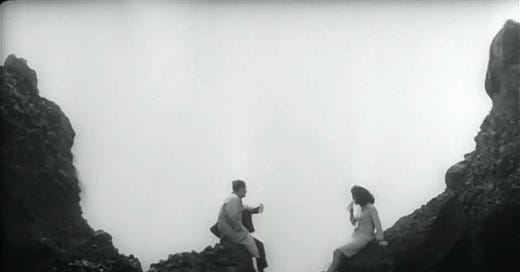


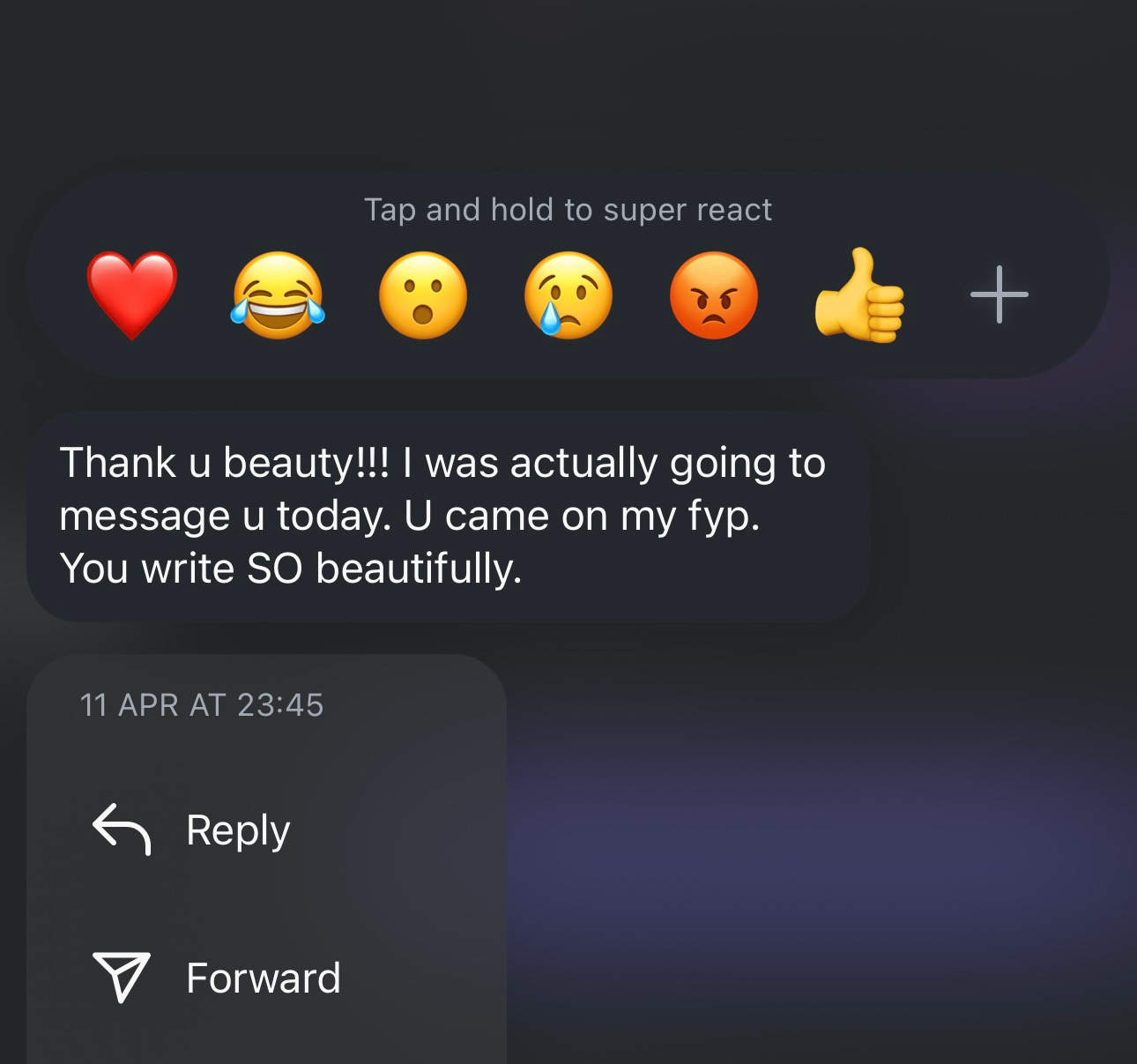
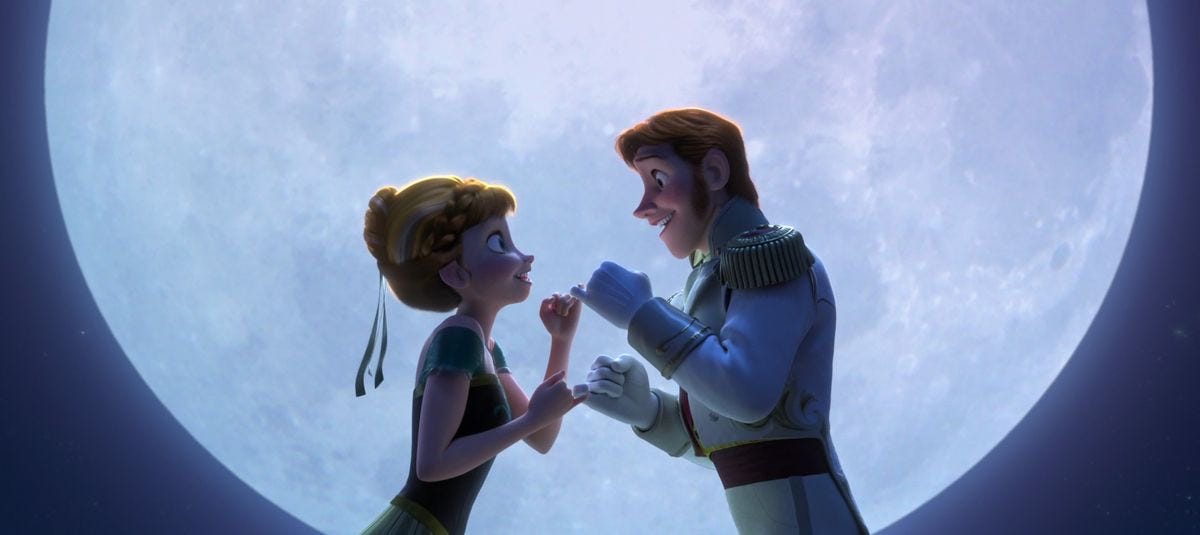
Wonderfully written! So much of this resonates <3
couldn't possibly agree more!! such a beautifully written and real piece <3